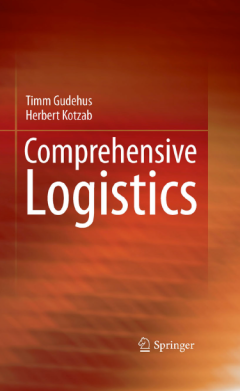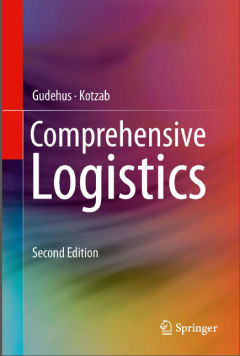Ditapis dengan

Internationalisation within liner shipping An examination of the sales networ…
Purpose – Container shipping is generally considered a global business. This truth may not hold from a single-company perspective. The companies’ physical operation etworks show that container carriers operate differently and follow different paths in their internationalisation development. Additionally, the degree of internationalisation, easured on the basis of sea-oriented operatio…
- Edisi
- Maritime Business Review
- ISBN/ISSN
- -
- Deskripsi Fisik
- 21 halaman
- Judul Seri
- Internationalisation within liner shipping An examination of the sales network structures of shipping lines
- No. Panggil
- ATC PO GUN a

Comprehensive logistics
- Edisi
- -
- ISBN/ISSN
- 978-3-540-68652-1
- Deskripsi Fisik
- -
- Judul Seri
- -
- No. Panggil
- TXT LO KOT c
- Edisi
- -
- ISBN/ISSN
- 978-3-540-68652-1
- Deskripsi Fisik
- -
- Judul Seri
- -
- No. Panggil
- TXT LO KOT c

Comprehensive logistics
- Edisi
- -
- ISBN/ISSN
- 978-3-642-24367-7
- Deskripsi Fisik
- -
- Judul Seri
- -
- No. Panggil
- TXT LO Gud c
- Edisi
- -
- ISBN/ISSN
- 978-3-642-24367-7
- Deskripsi Fisik
- -
- Judul Seri
- -
- No. Panggil
- TXT LO Gud c

3PL Factories or Lernstatts? Value-Creation Models For 3PL Service Providers
Purpose – The purpose of this paper is to identify and systematically discuss generic forms of contract logistics services and their distinct underlying approaches for fulfilling their respective value propositions. A general frame of reference is developed that addresses the value proposition, as well as the value creation architecture that leads to generic business model configurations f…
- Edisi
- Vol. 42 Iss 6 pp
- ISBN/ISSN
- 0960-0035
- Deskripsi Fisik
- 20 p
- Judul Seri
- International Journal of Physical Distribution & Logistics Management
- No. Panggil
- ATC LO PRO t

European retailing in e-transition?: An empirical evaluation of Web-based ret…
The management of electronic retail channels is not limited to virtual companies only. Also store-based (stationary) retailers are expected to set up electronic distribution channels. This paper discusses the occurrence of such channels from a European perspective. The authors introduce a Web-scan framework to analyze the nature of Web offerings and the logistical elements of e-tailing. The app…
- Edisi
- Vol. 31 No. 6, 2001, pp. 440-462.
- ISBN/ISSN
- -
- Deskripsi Fisik
- 25 p.
- Judul Seri
- International Journal of Physical Distribution & Logistics Management
- No. Panggil
- ATC LO MAD e

The consumer direct services revolution in grocery retailing: an exploratory …
To provide empirical evidence and explanation of the phenomenon that providers of home delivery of groceries are still of minor importance in highly concentrated retail markets.
- Edisi
- Vol. 16 No. 1, 2006 pp. 78-96
- ISBN/ISSN
- -
- Deskripsi Fisik
- 21 p .
- Judul Seri
- Managing Service Quality
- No. Panggil
- ATC LO GRA t

Complementary theories to supply chain management
The paper seeks to discuss and develop SCM as a scientific discipline using different theories from non-logistics areas to explain interorganizational phenomena. It also attempts to establish a frame of reference that allows us to mitigate the gap between the current SCM research and practice and the theoretical explanations of how to structure and manage supply chains.
- Edisi
- Volume 12 · Number 4 · 2007 · 284–296
- ISBN/ISSN
- -
- Deskripsi Fisik
- 17 p.
- Judul Seri
- Supply Chain Management: An International Journal
- No. Panggil
- ATC LO MIK c

Complementary theories to supply chain management revisited – from borrowin…
The aim of this paper is to identify ways by which the theorizing of supply chain management (SCM) takes place, with particular attention to complementary theories. SCM suffers as well as benefits from a “conceptual slack”.
- Edisi
- Volume 20 · Number 6 · 2015 · 574–586
- ISBN/ISSN
- -
- Deskripsi Fisik
- 15 p.
- Judul Seri
- Supply Chain Management: An International Journal
- No. Panggil
- ATC LO KOT c
 Karya Umum
Karya Umum  Filsafat
Filsafat  Agama
Agama  Ilmu-ilmu Sosial
Ilmu-ilmu Sosial  Bahasa
Bahasa  Ilmu-ilmu Murni
Ilmu-ilmu Murni  Ilmu-ilmu Terapan
Ilmu-ilmu Terapan  Kesenian, Hiburan, dan Olahraga
Kesenian, Hiburan, dan Olahraga  Kesusastraan
Kesusastraan  Geografi dan Sejarah
Geografi dan Sejarah